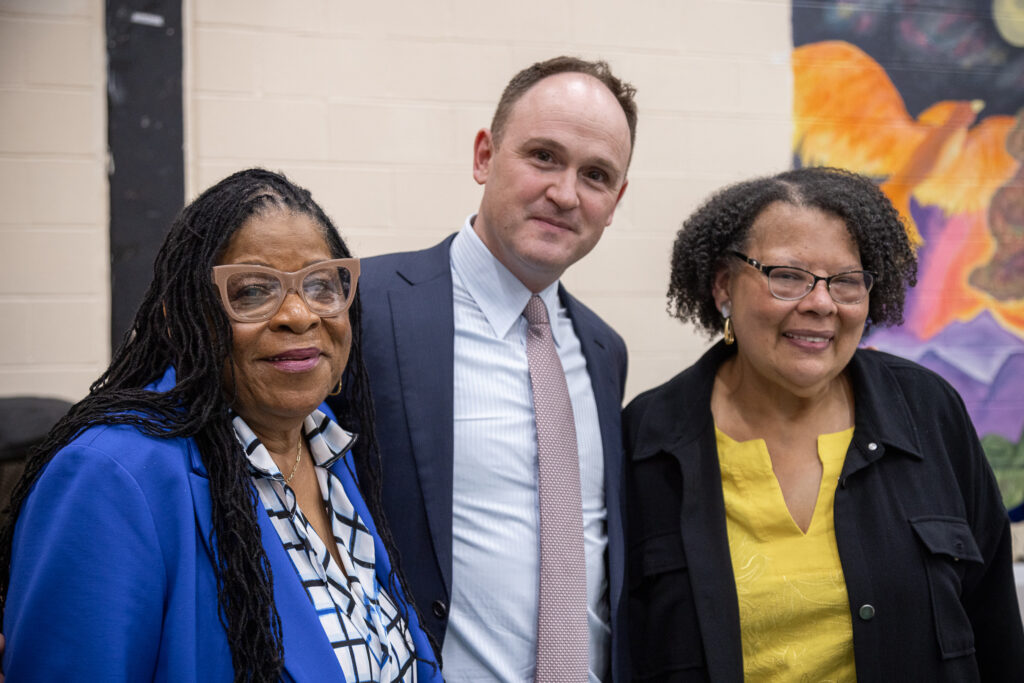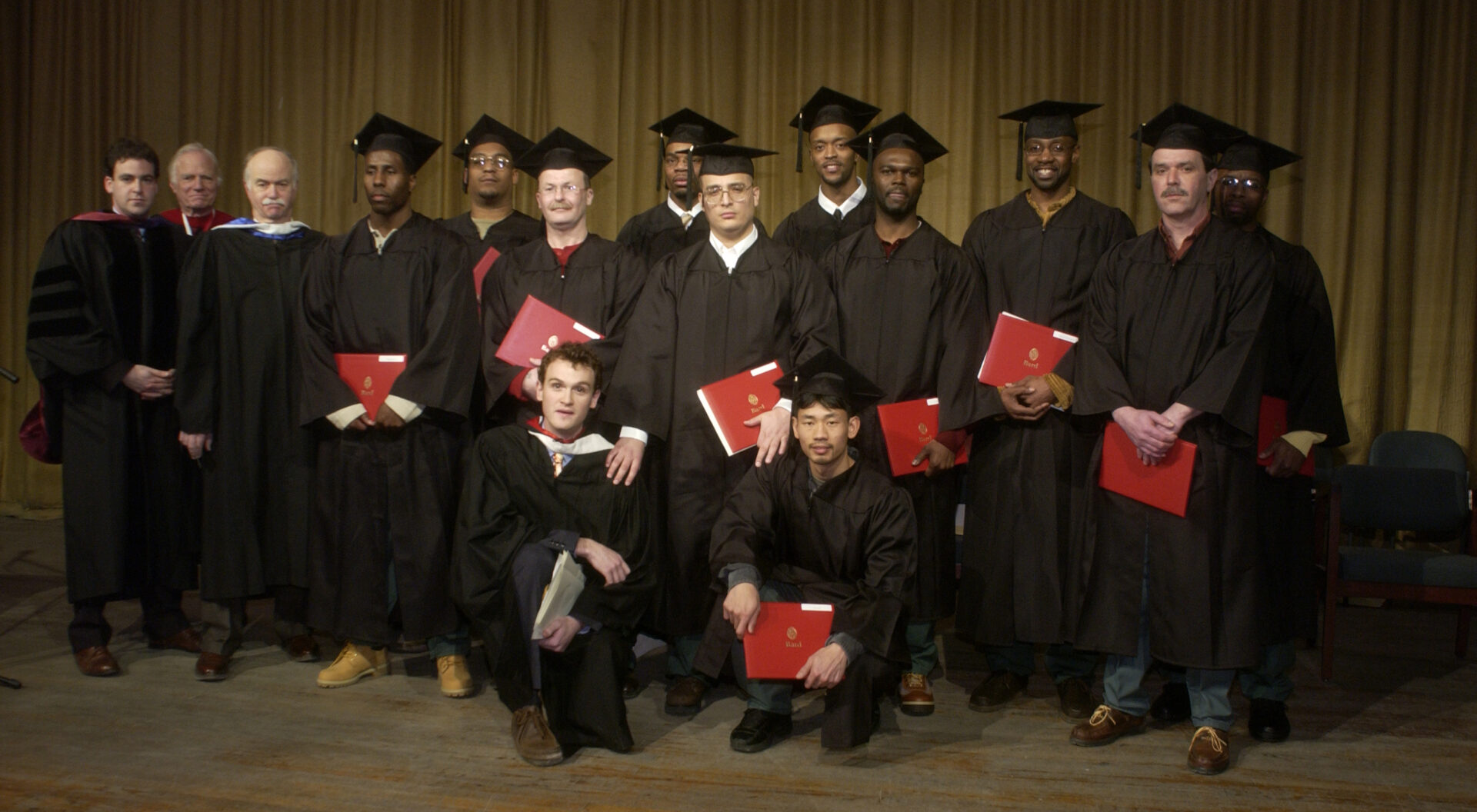History
Since 1999, the Bard Prison Initiative has been a national leader in restoring and expanding college opportunity in American prisons. Its academic programs are known for rigor and ambition; these programs transform the negative impacts of criminal punishment and create radical inroads of access and opportunity to higher learning. Today, BPI operates in seven correctional facilities and enrolls over 400 incarcerated students in full-time programs that culminate in degrees from Bard College. Once enrolled, BPI students embark on a rigorous course of study that matches the breadth and intensity of the Bard College learning experience. BPI supports students throughout their enrollment — and beyond — to identify ways that a liberal arts degree can carry forward into long-term plans.
Extrapolating from the successful establishment of the college, BPI has expanded in multiple directions. First, it is the home of a national Consortium for the Liberal Arts in Prison that cultivates, supports, and establishes college-in-prison programs in partnership with colleges and universities across the country along with the BPI Summer Residency for emerging practitioners. Second, its office of Reentry & Alumni Affairs works with formerly incarcerated Bard students as they pursue robust civic and professional lives after release. Most recently, BPI established the Bard Microcollege and BardBaccalaureate to bring full-scholarship, academically rigorous liberal arts college to isolated communities outside of prison. In all its work, BPI builds alliances to rethink access, reduce costs, and redress inequities in higher education.
Campuses
At Albion, Coxsackie, Eastern, Fishkill, Green Haven, Taconic, and Woodbourne Correctional Facilities, BPI enrolls over 400 students and organizes a host of extracurricular activities that replicate the extent of college life and inquiry. We call them campuses because that’s exactly what they are: spaces for thinking, learning, and challenging students to imagine success beyond the confines of their physical location.

Leadership
Max Kenner is founder and executive director of the Bard Prison Initiative and Vice President at Bard College. At BPI, Kenner holds the Tow Chair for Democracy and Education.
BPI is committed to creating opportunities for BPI, Microcollege, and BardBac alumni within the organization itself including the hiring, advancement, and increasing influence of BPI alumni in positions across the organization.
View All Staff

Max Kenner with Susan Burton (left) and Vivian Nixon, Senior Advisor to Bard Microcolleges (right).

Annual Report
“Twenty-five years ago, BPI was a glimmer of an idea. Inspired by a sense that our country was squandering its future by investing far too much in punishing young people while abandoning its commitment to educating them. The term ‘mass incarceration’ had barely been coined, but our view wasn’t only that there were far too many people in prison; it was that the cynicism about education and the enthusiasm for punishment were two sides of the same coin.
While colleges are closing, prisons are in crisis, and America, ultimately, is no more optimistic or hospitable than it was twenty-five years ago, BPI will continue to be an example of what is possible when we believe in one another. Today, BPI is here to stay.
Our charge now is to always remember how unlikely our success has been. Thank you for making that possible. Because of you, BPI’s next 25 years will be bigger and more transformative than the last.”
—Max Kenner ’01, Executive Director
Tow Chair for Democracy & Education
Policies
Accreditation
Bard College is accredited by the Middle States Commission on Higher Education. The courses of study leading to the bachelor of arts, bachelor of music, and bachelor of science degrees at Bard are registered by the New York State Education Department. The programs of study leading to the master of arts, master of arts in teaching, master of fine arts, master of business administration in sustainability, master of music, master of science in environmental policy, master of science in climate science and policy, and master of science in economic theory and policy degrees and the master and doctor of philosophy degrees in decorative arts, design history, and material culture at Bard are registered by the New York State Education Department, Office of Higher Education, Education Building Annex, Room 977, Albany, NY 12234; phone 518-486-3633.
Bard is also a member of the American Council on Education, American Council of Learned Societies, Association of American Colleges and Universities, College Entrance Examination Board, Commission on Independent Colleges and Universities, Education Records Bureau, and Environmental Consortium of Hudson Valley Colleges and Universities.
Educational Rights and Privacy Act
Bard College complies with the provisions of the Family Educational Rights and Privacy Act of 1974. This act assures students attending a postsecondary institution that they will have the right to inspect and review certain parts of their educational records and, by following the guidelines provided by the College, to correct inaccurate or misleading data through informal or formal hearings. It protects students’ rights to privacy by limiting transfer of these records without their consent, except in specific circumstances. Students have the right to file complaints with the Family Policy Compliance Office, U.S. Department of Education, Washington, D.C. College policy relating to the maintenance of student records is available, on request, from the Office of the Registrar.
Notice of Nondiscrimination
Bard College is committed to ensuring equal access to its educational programs and equal employment without regard to an individual’s sex, gender, race, color, national origin, religion, age, disability, gender identity, sexual orientation, predisposing genetic characteristics, marital status, veteran status, military status, domestic violence victim status, ex-offender status, or any other characteristic protected by federal, state, or local law. Students, employees, applicants, and other members of Bard College community (including, but not limited to, vendors, visitors, and guests) shall not be subject to discrimination or harassment prohibited by law or otherwise treated adversely based upon a protected characteristic. Similarly, the College will not tolerate harassing, violent, intimidating, or discriminatory conduct by its students, employees, or any other member of, or visitor to, the College community. This includes, without limitation, sexual harassment, sexual assault, sexual violence, dating violence, and domestic violence.
